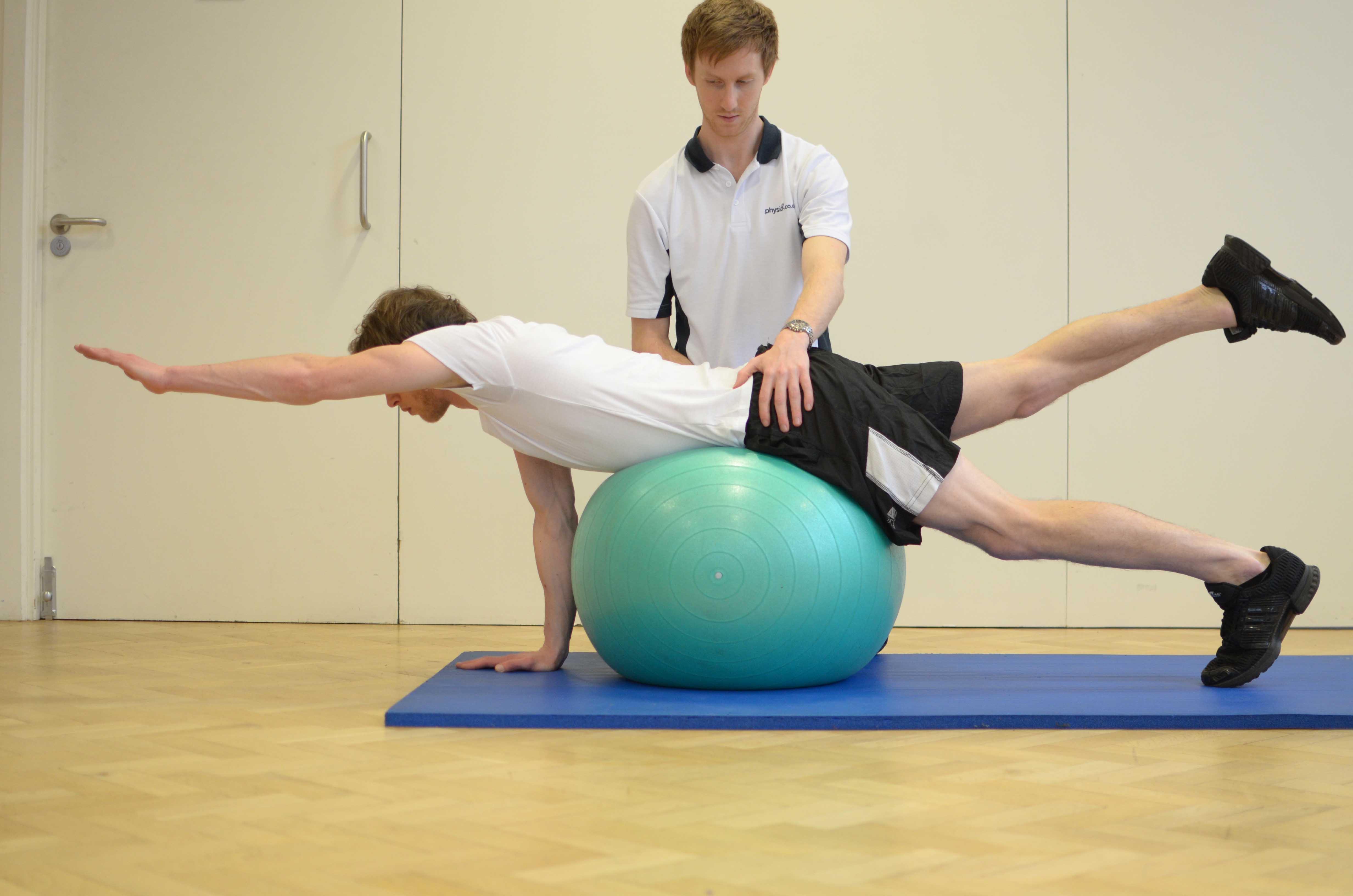Cervical laminectomy
A cervical laminectomy is a surgical procedure to widen stenosis (narrowing) of the spinal canal in the cervical (neck) region. This is often a result of wear and tear in the structures of the neck, especially the disks, joints and ligaments. Narrowing of the spinal canal in the neck, places pressure on the spinal cord which can lead to pain, numbness, tingling and muscle weakness in the arms and hands. It may also lead to difficulty or clumsiness walking.
The lamina is part of the spinal canals bony structure. A cervical laminectomy involves removing part or all of the lamina where the nerve roots or spinal cord is compressed to increase space and relieve pressure.
 Above: Passive stretch of the neck muscles and connective tissues
Above: Passive stretch of the neck muscles and connective tissuesPhysiotherapy before a cervical laminectomy
Physiotherapy treatment before your surgery will keep the muscles and joints in your neck strong and flexible to aid your recovery. It is important to remain active and continue with simple stretching and strengthening exercises in the weeks and days before your operation.
Symptoms after a cervical laminectomy
Following your surgery you will be given painkillers to relieve any pain and discomfort.You may also be given a soft collar to help support your head.A physiotherapist will usually get you out of bed on the day after your surgery. The aim is to get you mobile as soon as possible before discharge. You will be sent home with some simple exercises to promote healing and circulation and prevent stiffness. The usual hospital stay is about 1-3 days.
Physiotherapy following a cervical laminectomy
The time required for recovery varies between individuals. Physiotherapy treatment at Physio.co.uk after laminectomy surgery will enhance your recovery.
Our specialised physiotherapists offer individualised physiotherapy treatment for individuals following their cervical laminectomy surgery.
Physiotherapy treatment at Physio.co.uk will maximise your physical potential speed up your recovery by decreasing pain, increasing mobility and preventing scar tissue formation. During the first few weeks physiotherapy will reduce your pain and increase your confidence with movement. A progressive exercise programme will then be introduced tailored to your lifestyle which will enable you to return to full function. You will be supported throughout your rehabilitation process to ensure that you make progress and get you back to a level you were previously.
1-2 weeks
Physiotherapy treatment at Physio.co.uk during the initial couple of weeks will focus on:
- Increasing confidence when moving
- Reinforcing correct movement patterns
- Reducing any inflammation
- Pain management
- Gentle range of movement exercises to prevent stiffness and increase comfort
- Effective and safe transfers, i.e. sit to stand, getting in and out of bed, getting up and down stairs.
- Advise about posture when lifting, bending and reaching.
2-6 weeks
After the first couple of weeks, physiotherapy treatment will focus on restoring neck mobility and stability. This will be reinforced by a home exercise program to show you how begin to daily stretching and gentle strengthening activities for muscles in your neck, shoulders, and upper back. A walking program may also be devised to decrease pain and increase fitness. Regarding return to work, a different approach to each individual is necessary. If you have a sedentary job, you may be able to return to light work within two to three weeks. Individuals with heavy manual jobs will be advised to wait longer to return to work usually up to 3 months. Physiotherapy will monitor your progress through treatment goals and may include:
- Continuation of range of movement exercises
- Passive and Active assisted movements of the neck, arm and upper back
Stretching exercises to increase flexibility - Isometric strengthening of the neck muscles
- Walking
- Stationary cycling
6 -12 weeks
Once pain free range has been achieved, return to routine activities such as recreational activities will be incorporated into your treatment program. Progression of exercises will be a fundamental part of your rehabilitation to strengthen the muscles around your neck, shoulder and upper back and to stabilise the spine.
Physiotherapy treatment will be centred around your lifestyle and may include:
- Neck and abdominal strengthening exercises
- Continued aerobic exercises such as walking, swimming and stationary cycling
- Stretching to maintain increase in muscle length
- Exercises that are specific to your functional and sporting activities
12+ weeks
Your physiotherapist at this stage of your recovery will continue to work on your muscle strength, length and return to recreational activities.
Physiotherapy treatment may be continued for 3 months to ensure that you are confident and safe returning to normal activities. The length of your physiotherapy treatment will take time but commitment to the program will reinforce your recovery.
At Physio.co.uk, our physiotherapists will improve your quality of life but reducing pain and improving your independence with functional and sport specific activities.
For more information call Physio.co.uk now on 0330 088 7800 or to book an appointment please contact us.

 0330 088 7800
0330 088 7800


































